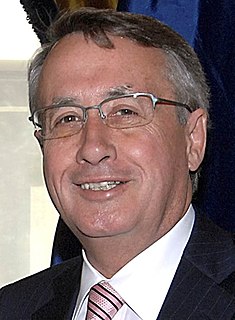A Quote by Joe Biden
We also wanted to change the story - change the approach to the 21st century on energy, on education, on transportation, on infrastructure, generally, and it laid the groundwork for that. And one of the reasons I'm doing this trip is not only to say what we did worked, but to say we should do more of this.
Related Quotes
In the Christian world, as you remember, Christianity is in the 21st century, Islam is in the 15th century. I don't mean to say that Islam is backward; I mean to say that there are certain experiences that it hasn't gone through. Christianity had the great religious wars of the 17th century. Islam, fortunately for the Muslims, did not have that. Christianity worked out a system of toleration. Islam was always more tolerant of Christendom.
The Information Age is, first and foremost, an education age, in which education must start at birth and continue throughout a lifetime. Last year, from this podium, I said that education has to be our highest priority. I have something to say to every family listening to us tonight: Your children can go on to college.... Because of the things that have been done, we can make college as universal in the 21st century as high school is today. And, my friends, that will change the face and future of America.
If you represent the Earth's lifetime by a single year, say from January when it was made to December, the 21st-century would be a quarter of a second in June - a tiny fraction of the year. But even in this concertinaed cosmic perspective, our century is very, very special: the first when humans can change themselves and their home planet.
Leadership is the great challenge of the 21st century in science, politics, education, and industry. But the greatest challenge in leadership is parenting. We need to do more than just get our enterprises ready for the challenges of the twenty-first century. We also need to get our children ready for the challenges of the 21st century.
There are times where fans don't understand that change is inevitable or that changes are done too fast. They say, 'We like the way you used to be.' Or they say, 'We liked what you did then.' You can't stay the same. As you mature as an adult, you find out you have to keep changing in this business. It's something The Undertaker laid on me.
I want to get the economy going again. It's not just enough about what we're against, as important as that is. I have a plan to create new jobs, manufacturing, infrastructure, clean energy jobs that will make us the 21st century clean energy super power. I also want to make sure small businesses can start and grow again.
The UK still has time to accelerate the take-up of renewable energy and put the nation on a path towards clean energy that is cheaper, stable and more sustainable. We have a stark choice: We can stay stuck in the last century's boom and bust approach to our economy in the way we consume energy and resources, or create a sustainable, stable and renewable energy infrastructure with the long term environmental and employment benefits that ensue
We have very stable mechanisms of conflict resolution in terms of labor relations, we have a very good transportation infrastructure, we provide our children with an excellent education and the gap between rich and poor in Germany is relatively narrow. On the other hand, we have trouble accepting change.
City farming is not only possible, it is the very definition of the kind of meaningful, sustainable innovation we will need to meet the grand challenges of the 21st century: climate change; population growth; ageing population; urbanization; rising demand for energy, food and water; poverty; and access to healthcare.
































